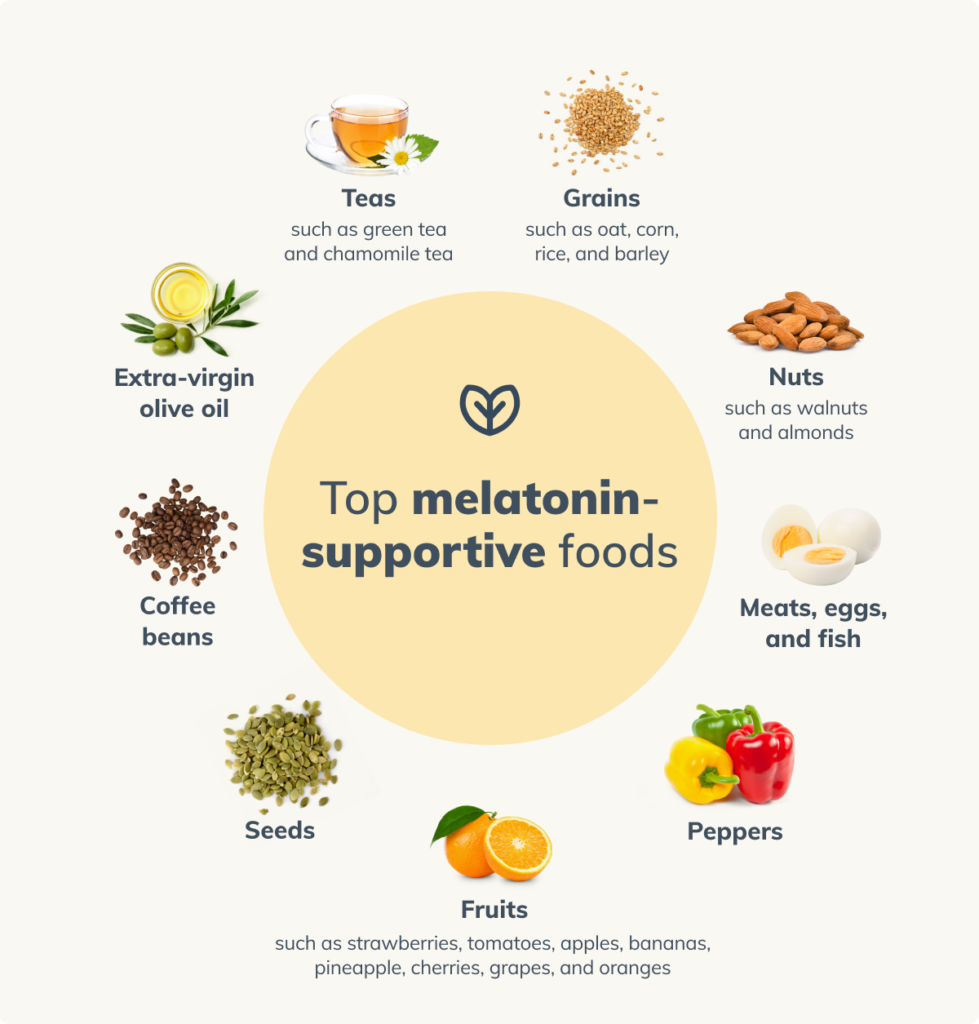Melatonin is often thought of for sleep and preventing sleep disorders, but research shows that this natural hormone may also have other beneficial effects on our bodies. Melatonin is naturally produced in our pineal gland. The pineal gland is located in the center of our brains and its main function is to alert our body when it is time to sleep and when it is time to wake. (1)(17) Although regulating our sleep is the main function of melatonin in our bodies, research shows that melatonin production in our body also supports our mental health, our reproductive system, and cell production. (1)(4)(10)
Along with these amazing benefits to our bodies, studies show it can support our cardiovascular system (heart and blood vessels), promote anti-aging and reduce inflammation, along with so many more! (2)(3)(9) Although our bodies naturally produce melatonin, aging and lifestyle factors can impact how well our bodies produce this hormone and prevent melatonin deficiency. Continue reading to learn more about how to increase melatonin production.

What affects melatonin production?
Although this hormone is produced naturally by our pineal glands, melatonin production can be impacted by various factors. Melatonin is produced by our bodies in response to darkness. Exposure to light blocks our bodies from producing this hormone, impacting our ability to keep a regular 24-hour sleep cycle. (8) Along with its role in regulating our sleep and sleep patterns (circadian rhythm), melatonin has also been shown to be highly involved in our reproductive system function, cell production throughout our bodies, and other bodily functions. (1)(10)
Our age has a significant impact on how well and how much our bodies produce melatonin. Throughout our lives, from infancy to 90 and over, our bodies’ ability to produce melatonin changes. It probably doesn’t come as a surprise that our melatonin levels are at their lowest during infancy and only start to increase around two to three months of age. (6) From this young age, there is a steady increase in our bodies’ production of melatonin until we hit puberty, and then it decreases in our late teens. (1)
After our late teens, our melatonin levels stay rather stable until around 35 to 40 years old, when it starts to decrease again as we age. At around 90 years of age, our melatonin levels are less than 20% of what they were in early to middle age. (1)
Our bodies’ decline in melatonin production due to aging has been shown to be caused by a few natural occurrences in our body, such as the natural aging process of our pineal gland and eyes. (1) It comes as no surprise that as we age, so do our organs which impact their ability to function in the way they once did.
Ready to start delivering better patient care?

Benefits of melatonin
Though melatonin is only produced in our pineal glands, the effects of this hormone are shown throughout the body and have a significant impact on our overall health. Melatonin is most known for its ability to support our 24-hour sleep habits, improve our sleep quality, and reduce the negative effects of jet-lag. (2) But the benefits of melatonin in our bodies goes further than that. Research has shown that melatonin supports our bodies by providing:
- Antioxidant and anti-inflammatory abilities
- Immune system support
- Anticancer activity
- Liver support
- Cardiovascular support
- Anti-aging effects
- Antidiabetic (blood sugar regulation) effects
- Anti-obese activity and weight loss support (2)(3)(9)
Along with all of these other benefits, recent research has shown that melatonin may have the ability to support individuals facing mental health diseases such as depression and anxiety. (14) In fact, when compared to pharmaceutical anxiety medication, melatonin was shown to be as effective in reducing anxiety in patients with surgery-induced anxiety.. In a study that looked at male and female individuals between the ages of 15 and 90, melatonin was shown to be more effective in reducing anxiety compared to a placebo. (4) Melatonin has also been shown to be highly involved in our reproductive system functions (shown that it could have a positive impact on female ovulation and support during labor and birth), positive cell production throughout our bodies, and other possibly many more bodily functions. (1)(10)(12)
Tip: A placebo is a non-medicated substance that is given to a patient instead of the active ingredient to be used as a control group. (11)
Melatonin deficiency and what it looks like
As we age, our bodies naturally produce less melatonin due to the natural process of aging and its effects on eyes and pineal glands. (1) That being said, if our levels of melatonin drop below what they should be, leading to a melatonin deficiency, this can have a negative effect on our overall health. Though the most common outcome of a melatonin deficiency is insomnia or other sleep disorders, this deficiency can lead to other issues within the body. (5)
Studies have shown that individuals with various diseases such as mood disorders, eating disorders such as bulimia, chronic pain, dementia, cancer, and type 2 diabetes commonly show reduced blood levels of melatonin. (5)(15) Along with these diseases, individuals who suffer from long-term depression, seasonal depression, and unipolar depression also tend to show low levels of melatonin. (15)
How to increase melatonin production
Knowing the impacts of low melatonin, it is important to know how to increase melatonin production. Although our bodies naturally produce this beneficial hormone, sometimes it needs a little help to keep our levels where they should be. Foods that promote melatonin production, lifestyle changes, and supplementation may help keep our bodies on track to avoid a melatonin deficiency. (9)

1. Foods that promote melatonin production
In recent years, it has been identified that many foods are shown to be rich in melatonin and can help give our bodies a little extra of this needed hormone. (9) Here is a list of the top 10 melatonin-rich foods that can be added to your diet to give your body a little extra dose of melatonin. Studies have shown that eating some of these melatonin-rich foods can not only help with sleep but also increase your blood melatonin levels, supporting your body with the other functions that melatonin supports. (9)

2. Blue light reduction
In the world we live in today, blue light is found everywhere from our phones to our televisions and computers. Although it’s hard to avoid blue light, studies have shown that exposure to blue light suppresses our bodies’ ability to produce melatonin. (18) Research shows that overexposure to blue light can lead not only to imbalanced circadian rhythms and sleep loss but also reduced alertness and performance. Compared to white fluorescent lights, studies show that blue LED light has a much larger effect on suppressing our bodies ability to produce melatonin. (18)
Due to this research, it may be helpful to avoid blue light close to bedtime and throughout the night to give our bodies the chance to produce the melatonin we need for a good night’s sleep.
3. Melatonin supplements
Even though we can support our bodies natural ability to produce melatonin with the foods we eat and lifestyle changes, sometimes our bodies need a little extra support to keep our melatonin levels optimal. With minimal side effects shown, supplementing with melatonin can support our bodies and provide us with many of the benefits of natural melatonin. (4)(8) Supplementing with melatonin is one answer to the question of how to naturally increase melatonin.
Melatonin supplementation has been found to help reduce difficulties falling asleep and improve our bodies’ circadian rhythms. Supplementation of melatonin has also been shown to support jet lag, some sleep disorders in children, and anxiety. (8) Along with healthy sleep, melatonin supplementation has been shown to support individuals dealing with depression, anxiety, and bipolar disorders. (5)
In athletes, as intense and prolonged exercise impacts our bodies natural ability to produce melatonin, supplementation is used to regulate sleep cycles and prevent muscle damage. (7)
As with all supplements, it is important to consult your healthcare provider to ensure that supplementing with melatonin is safe and right for you.
The bottom line
Not only needed to keep ourselves asleep during the night and awake during the day, melatonin has shown that its beneficial effects reach to all areas of the body. The more research that is done on this natural sleep hormone, the more we discover its ability to impact our overall health. Though the benefits are plenty when our body is effectively producing this hormone, low levels of melatonin within the body can increase the risk of major health issues.
Thankfully, the answer to how to increase melatonin production is easy. Ensuring that we are eating foods that promote melatonin production, reducing our blue light, and supplementing when needed can help support optimal melatonin production and levels.
Ready to start delivering better patient care?

- Arendt J, Aulinas A. Physiology of the Pineal Gland and Melatonin. . In: Feingold KR, Anawalt B, Boyce A, et al., editors. Endotext . South Dartmouth (MA): MDText.com, Inc.; 2000-. https://www.ncbi.nlm.nih.gov/books/NBK550972/
- Bonomini, F., Borsani, E., Favero, G., Rodella, L., & Rezzani, R. (2018). Dietary Melatonin Supplementation Could Be a Promising Preventing/Therapeutic Approach for a Variety of Liver Diseases. Nutrients, 10(9), 1135.
- Claustrat, B., & Leston, J. (2015). Melatonin: Physiological effects in humans. Neurochirurgie, 61(2–3), 77–84.
- Hansen, M. V., Halladin, N., Rosenberg, J., Gögenur, I., & Møller, A. M. (2012). Melatonin for preoperative anxiety in adults. Cochrane Database of Systematic Reviews.
- Hardeland, R. (2012). Neurobiology, Pathophysiology, and Treatment of Melatonin Deficiency and Dysfunction. The Scientific World Journal, 2012, 1–18.
- Kennaway, D. J., Stamp, G. E., & Goble, F. C. (1992). Development of melatonin production in infants and the impact of prematurity. The Journal of Clinical Endocrinology &Amp; Metabolism, 75(2), 367–369.
- Kruk, J., Aboul-Enein, B. H., & Duchnik, E. (2021). Exercise-induced oxidative stress and melatonin supplementation: current evidence. The Journal of Physiological Sciences, 71(1).
- Melatonin: What You Need To Know. (n.d.). NCCIH. https://www.nccih.nih.gov/health/melatonin-what-you-need-to-know
- Meng, X., Li, Y., Li, S., Zhou, Y., Gan, R. Y., Xu, D. P., & Li, H. B. (2017). Dietary Sources and Bioactivities of Melatonin. Nutrients, 9(4), 367.
- Nabavi, S. M., Nabavi, S. F., Sureda, A., Xiao, J., Dehpour, A. R., Shirooie, S., Silva, A. S., Baldi, A., Khan, H., & Daglia, M. (2019). Anti-inflammatory effects of Melatonin: A mechanistic review. Critical Reviews in Food Science and Nutrition, 59(sup1), S4–S16.
- NCI Dictionary of Cancer Terms. (n.d.). National Cancer Institute. https://www.cancer.gov/publications/dictionaries/cancer-terms/def/placebo
- Olcese, J. M. (2020). Melatonin and Female Reproduction: An Expanding Universe. Frontiers in Endocrinology, 11.
- Reiter, R. J., Manchester, L., & Tan, D. X. (2005). Melatonin in walnuts: Influence on levels of melatonin and total antioxidant capacity of blood. Nutrition, 21(9), 920–924.
- Repova, K., Baka, T., Krajcirovicova, K., Stanko, P., Aziriova, S., Reiter, R. J., & Simko, F. (2022). Melatonin as a Potential Approach to Anxiety Treatment. International Journal of Molecular Sciences, 23(24), 16187.
- Rohr, U. D., & Herold, J. (2002). Melatonin deficiencies in women. Maturitas, 41, 85–104.
- Tan, D. X., Zanghi, B. M., Manchester, L. C., & Reiter, R. J. (2014). Melatonin identified in meats and other food stuffs: potentially nutritional impact. Journal of Pineal Research, 57(2), 213–218.
- Tan, D., Xu, B., Zhou, X., & Reiter, R. (2018). Pineal Calcification, Melatonin Production, Aging, Associated Health Consequences and Rejuvenation of the Pineal Gland. Molecules, 23(2), 301.
- West, K. E., Jablonski, M. R., Warfield, B., Cecil, K. S., James, M., Ayers, M. A., Maida, J., Bowen, C., Sliney, D. H., Rollag, M. D., Hanifin, J. P., & Brainard, G. C. (2011). Blue light from light-emitting diodes elicits a dose-dependent suppression of melatonin in humans. Journal of Applied Physiology, 110(3), 619–626.





